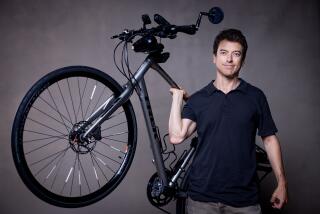Opinion: Why are cities allowing bicycle theft to go virtually unpunished?
Michael Fishman’s heart still sinks when he remembers the time his beloved bike, custom painted in Lakers purple and gold, was swiped while he watched a midday movie with his wife near his Silver Lake home. An evangelist for the car-lite urban bike lifestyle Los Angeles is struggling to cultivate, Fishman was invested in the bike. It was his primary means of transportation, so losing it was a blow — the kind that forces many would-be cyclists in Los Angeles straight back to their cars.
In Los Angeles and virtually every city in North America, bicycle theft has almost become a crime without consequence, so widespread that it is treated less as a problem and more like one of the costs of urban life. Thieves can quickly cut locks on a target that serves as its own getaway vehicle, sell their ill-gotten goods to fencers for pennies on the dollar, and rest assured they will almost never be busted. Law enforcement officials, busy with other priorities, rarely commit to sustained campaigns to bust theft rings or even pursue arrests.
Accurate data on bike thefts are difficult to come by. The FBI reported 210,905 bike thefts in the U.S. in 2014, a number that likely severely undercounts the true scope of the problem. An analysis by the Oregonian in Portland found that arrests occurred in just 2% of reported bike thefts in that city. The same study found as few as 70% of thefts are even reported. Cycling advocate J Allard spent several years researching bike theft and couldn’t find a single person in North America who had a full-time job dedicated to stopping the problem.
Despite this general apathy, there are serious consequences to bike theft. A 2014 federal government survey found the most likely group of people to ride a bike to work are those earning less than $10,000 a year. For such working poor who have no other means of getting around, bike theft is more than an inconvenience: It can wipe out a livelihood.
More broadly, bike theft can be totally discouraging for victims at a time when cities are finally opening up to the idea of accommodating urban cycling. One study in Montreal found that more than 7% of victims never replace their bike.
How can city officials expect to get drivers out of their cars if they are unwilling or unable to protect bicycles from theft?
Unfortunately, left with almost sole responsibility for theft prevention, bike owners often don’t do themselves many favors. Bicycle advocates may seethe over what they see as indifference and victim-blaming when police advise owners to do a better job of locking up. But the police are often correct. Too many consumers are reluctant to invest in quality locks or take the time to properly secure their bicycles in public locations. Many don’t even bother to write down their bike’s serial number, making it virtually impossible for police to return a stolen bike should they recover it. Too many consumers also turn a blind eye to obviously stolen bikes being sold for peanuts on websites like Craigslist.
Thankfully, growth in urban cycling in recent years has finally led to some more serious attempts to combat the problem.
Smarting from the loss of his prized bike, Fishman and his company Pure Cycles develop an urban e-bike called the Volta that comes with build-in GPS tracking. Such devices are becoming more common, and can help victims recover stolen bikes. But GPS systems have limitations, including limited battery lives.
Several cross-jurisdictional online bike registries, such as the National Bike Registry and Bike Index, now allow consumers to register their bikes on a website that can be checked by police when stolen bikes are recovered. This approach, however, does nothing to prevent thefts in the first place.
Slowing the growing rash of bike theft will likely require the kind of widespread, comprehensive strategy developed by advocate J Allard, who is trying to convince cyclists, bike-shop owners, law enforcement officials, governments and even online resellers to unify in pursuit of a solution. His company offers online registration for cyclists, which includes a numbered tag that can be affixed to a bike — much like a motor-vehicle license plate. He hopes these tags will not only aid in recovery of stolen bikes, but will disincentivize thieves from selling stolen goods in the first place.
For this system to be effective, however, it must be adopted across industries, jurisdictions and even borders. This could prove problematic, as it shares similarities with mandatory bicycle registration — an idea that is anathema to many cycling advocates because it often gets conflated with bike licensing, which is seen as a counterproductive attempt to limit the rights of cyclists on the road.
Even with a widely adopted registration system, however, fighting bike theft will still require something even greater — an acceptance by society that the problem isn’t trivial or unavoidable, and a commitment to do something about it. Until then, would-be riders are stuck with the disheartening and often dubious advice long doled out by veteran cyclists around the world: If you don’t want your bike stolen, don’t ride a bike that anybody will want to steal.
Tom Babin is the author of “Frostbike: The Joy, Pain and Numbness of Winter Cycling.” He blogs about bikes at shifter.info.
Follow the Opinion section on Twitter @latimesopinion or Facebook
More to Read
A cure for the common opinion
Get thought-provoking perspectives with our weekly newsletter.
You may occasionally receive promotional content from the Los Angeles Times.










